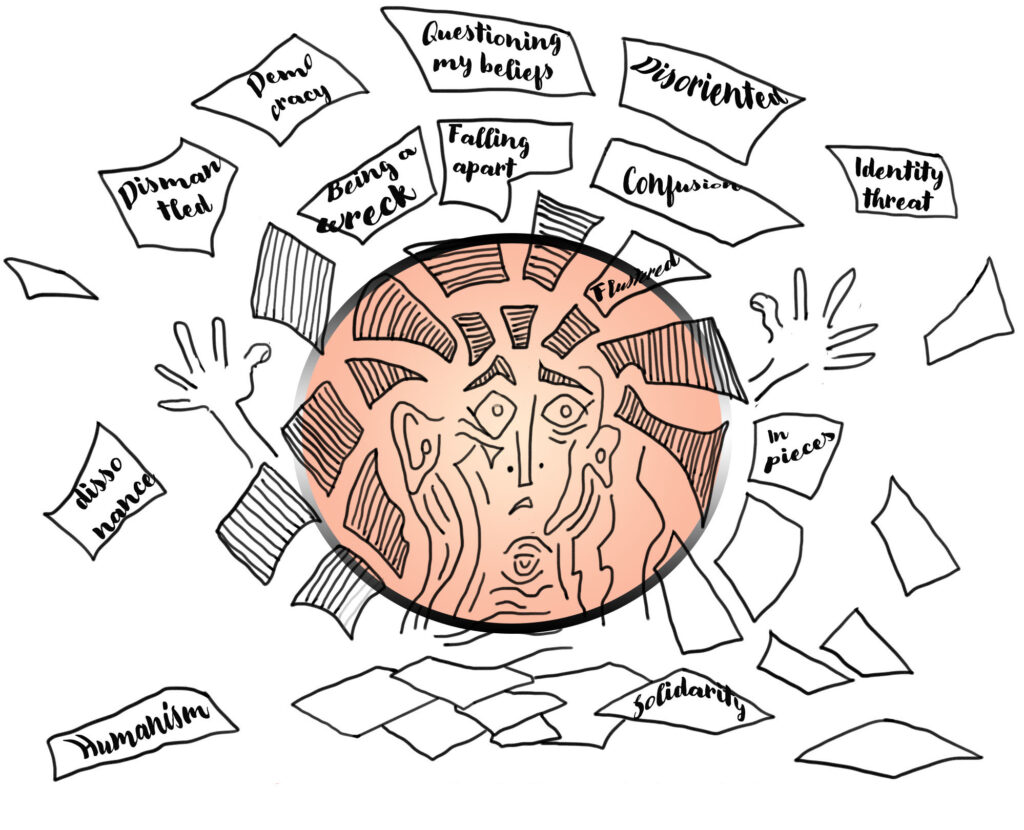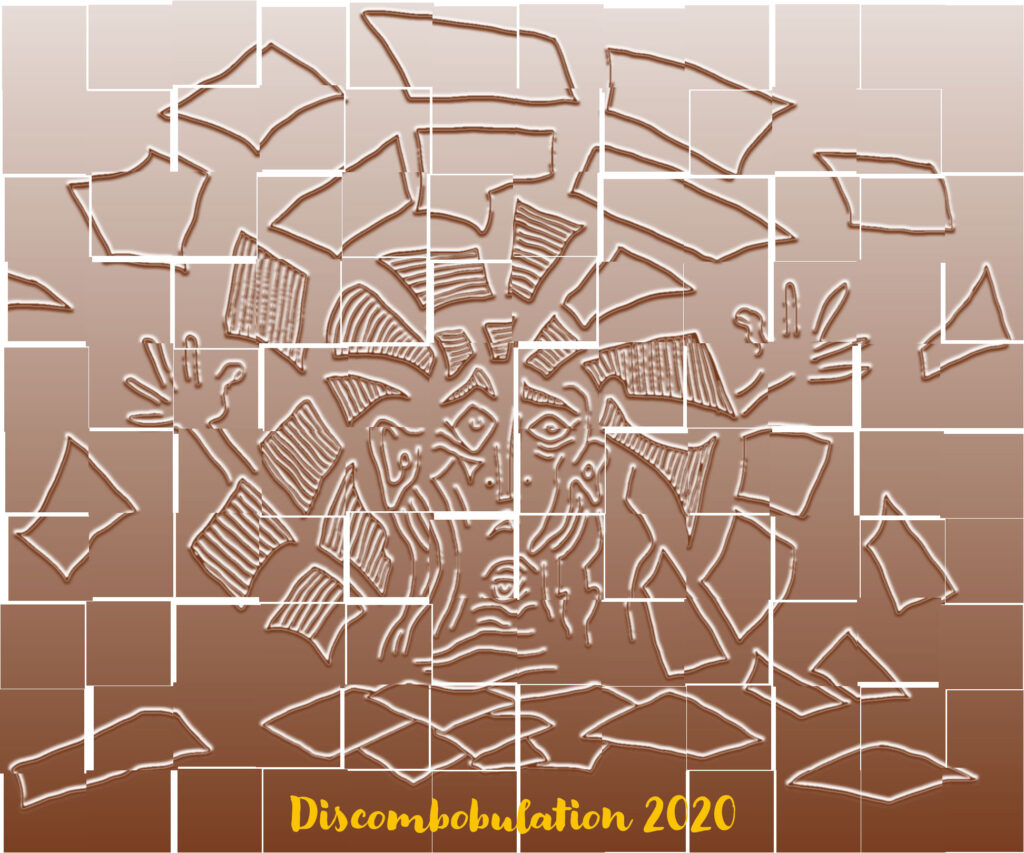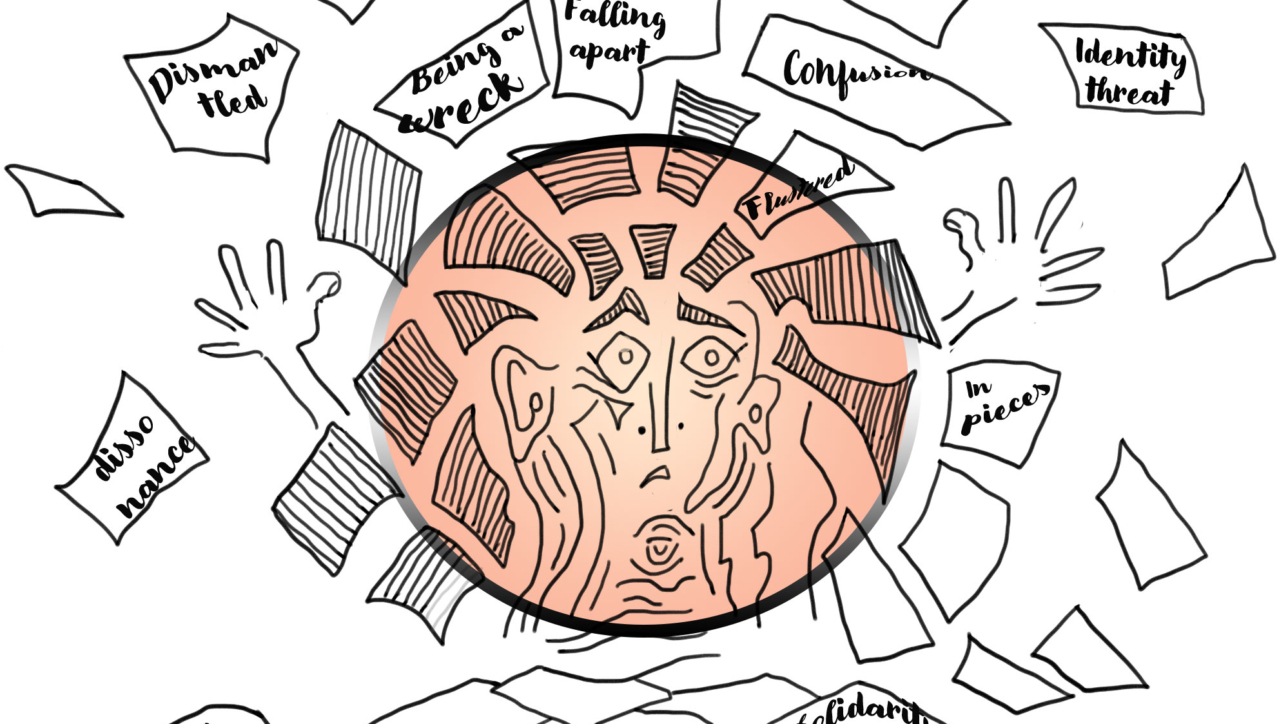Synopsis: I thought my humanist values were unshakeable until political upheavals in 2020 and 2025 left me completely discombobulated. This is my meditation on ideology and identity, falling apart and reassembling, stronger in my values, trusting in humanity’s unshakeable capacity for growth, reflection and moral progress. (8-10 min. reading time)

Last December, alarmed by the unpredictable political changes on the horizon, I was determined to stand up as a warrior of the human spirit and embody sane leadership (link)– a posture that exhibits mindfulness, edification, discernment, self-regulation, kindness and team support.
As a practitioner in the field of leadership and human potential development, I work within a stream of thought that centers on human dignity, growth and trust in the workplace. For more than two decades, I’ve advocated for the promises of leadership in the 21st century – to be humble, ego-free, relational, nimble, diverse, inclusive and distributed – necessary to address the adaptive challenges of our times.
At the end of January, when the new administration took office, I was a wreck — outraged and speechless — going from sideration to confusion, consternation to rage, political disgust to comfort-food absorption, social-media binging to news disconnection.
I was in ideological shock, stupefied by the outdated, domineering and transactional leadership, the speed of radical changes established by the new administration, and the flood of brazen orders dismantling programs that were apparently too liberal or too representative of the old post-World War II consensus for the new regime.
Among the flood of orders was one ending federal DEI programs, calling them ‘illegal,’ ‘immoral,’ and ‘discriminatory.’ How could programs designed to fight discrimination be called discriminatory? The language felt like a deliberate, almost cynical, inversion of everything I believed in.
The post-World War II consensus I was born into – my order, humanist and progressive – was under an all-encompassing, unabashed attack.
I know, it wasn’t a perfect order, with its galloping modernity carrying perennial greed, appetite for domination, and arrogant superiority. Proof of its flawed nature is, it has allowed the rise and election of those who want to destroy it. But it has also carried the tools, skills and mindset to fix its flaws.
I thought my order was inevitable, unquestionable, consensual and grounded in common sense. I assumed that everyone shared this vision – that, ultimately, we were all motivated and excited to move toward more consciousness about social and environmental issues to preserve a viable planet, more international solidarity to prevent atrocities, more equitable redistribution of resources to benefit everyone while respecting cultural differences…
Suddenly, I realized that not everyone thinks as I do, wanting everyone to be reasonably happy (basic essential needs being met), and that since Buddha’s time, greed, hatred and delusion are still the three poisons of humanity and growing exponentially.
Struck by my own delusion, in the year I turned 60, I got discombobulated.
*
Discombobulation isn’t necessarily a bad thing. It can be the birthplace of awakening, when we experience a profound shift in consciousness that can fundamentally alter perspective in ourselves and in the world.
When we discombobulate, we first fall apart, then reassemble – ideally into a wiser version of ourselves. Breaking into pieces gives us a chance to examine what we’re actually made of – our ideologies – the lived beliefs that shape how we move through the world, and how we think about society, morality, politics, economics and the value of life itself.
Part of my ideological shock—beyond being flooded by the speed of inflammatory (often illegal) new orders from the top, coupled with the discovery that not everyone worships democracy —was realizing that I couldn’t put my shock into words.
My political orientations were more intuitive than articulated.
I knew my values and preferences on key societal questions but lacked the language or political knowledge to articulate my positions, engage in constructive conversations or even, bring my voice to the table. In my awkward attempts to express myself, I used vague words, fell into clichés, became emotionally reactive – annoyed, impatient, and judgmental- or simply fell silent.
Ideologies are deeply emotional. We identify with what we think. In other words, we think we are what we believe, and when our beliefs are challenged, our whole being trembles as if our entire identity is being threatened.
We are not our beliefs. Yet, we are the stories we tell ourselves about who we are. We are the stories of our parents, grandparents and previous generations – the ones we drag with us, the ones we manage to let go of, or to reinvent. Making our stories explicit helps know where we stand and finds more meaning in life.
My ideology was shaped growing up in a culturally mixed family – Moroccan and French, Jewish and atheist, steeped in the French secular Republican values of Liberty, Equality and Fraternity – a tradition of human dignity and capability, education, rational thinking, and universal rights. Respect of others’ differences was always paramount. I still stand firm in these values.
The beauty and burden of these values is to make discombobulation both necessary and possible. Therefore, 2025 wasn’t my first discombobulation.

I got discombobulated in 2020, during the COVID crisis, after watching the murder of George Floyd, eight horrifying minutes that exposed not just individual brutality, but normalization of violence and racism. It was a shock that lifted a veil – suddenly we could see harsh reality more clearly. For me, someone who thought I understood structural racism intellectually, it was an awakening to see the emotional connection that had been missing.
The pandemic turned our working lives upside down, but after George Floyd’s murder, I couldn’t do business as usual – and neither could many people in my professional circles. Organizations everywhere were grappling with the same reckonings.
There was energy, momentum, a sense that change was not just possible but necessary and inevitable. I became focused on integrating this new dimension of self-awareness into my work – how our social identities impact our relationships; how we can foster learning cultures where everyone feels seen and valued.
My discombobulation had given birth to a modest breakthrough in clarity. I started partnering with ‘DEI’ consultants, finding ways to weave together my focus on ego work and leadership development with their expertise on racial equity, diversity, inclusion, and systemic change.
Many organizations made genuine commitments, though others were performative, and the sprawling scope of what ‘DEI’ encompassed generated confusion alongside solutions. I thought it was an exciting time, messy, exploratory, sometimes excessive and awkward, but creative.
The backlash was swift and intense, fueled partly by this very confusion about what DEI actually meant. While public opinion had initially been supportive of DEI programs, by 2024 it had shifted, caught between anti-DEI backlash and some DEI approaches that felt heavy-handed or exclusionary.
I was still processing this when 2025’s discombobulation hit. 2025 felt like the reverse of 2020. In 2020, my limited worldview cracked open to reveal a more complex reality. In 2025, that expanded reality itself was under attack. When 2020 was supported by collective momentum and federal policies toward social justice, 2025 left me feeling trapped and anxious, watching policies dismantle the social, environmental and moral progress that had felt so promising.
Yet, the process of generative discombobulation remains the same. Step back from the chaos, reflect deeply, and clarify who we are and what we stand for.
*
Perhaps you’ve felt disoriented and confused too. Perhaps you found your way, or perhaps you’re still discombobulated. Don’t be discouraged. Discombobulation, growth, backlash, deeper reflection… it’s a pattern ofvitality. The greater danger is to feel nothing and be disconnected from what matters to you and how you can contribute to our collective social fabric.
Gratefully, I’m coming out of my discombobulation and have started to reassemble. It has helped to create a glossary, capture definitions, and articulate the ideologies that have shaped my journey. I’m grounded in a flowing bouquet of values – pacifist, existentialist, humanist, universalist, eco-humanist and democratic. I’m ready to nurture all of them and learn gardening.
Fundamentally, we need to cherish, enjoy and share our human capacity for growth, reflection and moral progress. These capacities are the foundation of human dignity that is our birthright.
PS: I’ve had to temporarily disable comments due to spam and trolling, but I’d love to hear from you! Please feel free to send me an email if you have any questions, thoughts, or would like to share your perspective on anything I’ve written. I really value connecting with readers and always enjoy our conversations.







